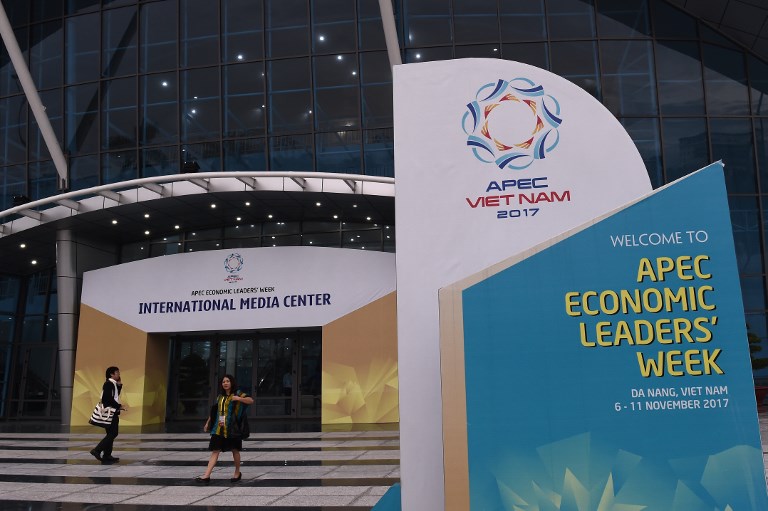Apec business leaders call for structural, trade reform

People walk outside the media centre ahead of the Asia-Pacific Economic Cooperation (APEC) Summit in the central Vietnamese city of Danang on November 7, 2017. / AFP PHOTO / LILLIAN SUWANRUMPHA
In their annual report to APEC leaders, released on Monday, members of the APEC Business Advisory Council (ABAC) called for leadership on further liberalization of trade in goods and services and investment flows.
The issues will be discussed by ABAC members in their annual dialogue with APEC leaders on Friday.
“This means tackling structural reforms and non-tariff barriers, encouraging cross-border investment and maintaining the commitment to make the Free Trade Area of the Asia Pacific a reality,” the 2017 ABAC Chair, Hoang Van Dung said.
“We are seeing broad economic recovery regionally and globally” said Dung said at a press conference on Monday at the end of the fourth and final ABAC meeting in 2017.
“The IMF (International Monetary Fund) and OECD (Organization for Economic Co-operation and Development) have projected global GDP will increase by 3.7 per cent next year, up from just over three per cent in 2016, and trade flows are also recovering.
“But just as this recovery has taken longer to emerge from the 2008 crisis, so we need to create a more accommodative environment for sustained and inclusive economic growth in our region to ensure we don’t lose momentum,” he added.
“That means stronger action on deeper structural reform to boost productivity, wages and skills, and putting in place the right domestic policies to enable people and businesses to adjust to a more globalized world,” he said.
Dung emphasized that ABAC members were united in their support for a rules-based global trading system.
The report also highlights the transformative potential of the digital economy.
“Our communities at all stages of development can benefit hugely from the digital revolution. But we cannot let a ‘digital divide’ leave behind the more vulnerable,” Dung said.
“Across the region, we need solid digital infrastructure, skills that empower our workforce for the jobs of the future, and a regulatory environment that enables the movement of data and information across borders while also safeguarding privacy and security appropriately,” he added.
“The issue of digitalization and internet economy is critical for APEC and we have been working really hard on it,” said Chair of the ABAC Connectivity Working Group, Anthony Nightingale.
“The important part is that being programs to help empower and educate small and medium enterprises they can contribute more and participate more in the international economy.”
ABAC will focus further on these issues in 2018, when Papua New Guinea will chair APEC.
The report highlights the imperative to help women participate more broadly in economies, and to help medium- and small-sized enterprises participate in trade.
Dung affirmed the commitment of the business community to partner with governments to ensure a prosperous Asia-Pacific.
“We have commissioned research by the USC Marshall School on why some in our economies question the value of open trade, investment and globalization. Notwithstanding the tremendous benefits brought by trade and investment, domestic policies have not kept pace with the rate of change. We need to work with governments to show the actual benefits to our communities and identify additional steps to be taken to respond effectively to these concerns and the changes still to come.”
“ABAC members are enthusiastically looking forward to our direct dialogue with leaders. It is only by fully understanding both the benefits of open trade and investment and by business and governments working together with our communities to adapt that we will together realize the mighty potential of our region,” concluded Dung.
Rod Eddington, Chairman of JP Morgan’s Asia Pacific Advisory Council, said free trade remains a priority for APEC as they believe that liberalizing trade creates economic opportunities, drives growth, and deepens integration.
“We believe we have good pathways towards free trade in the Asia-Pacific region.”